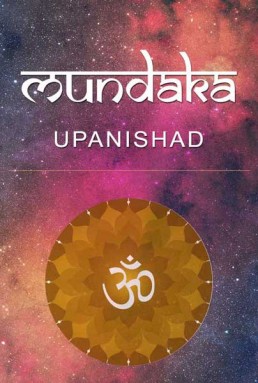अप्रमत्तेन वेद्धव्यं शरवत् तन्मयो भवेत् ॥ ४॥
apramattena veddhavyaṃ śaravat tanmayo bhavet .. 4..
प्रणवः (praṇavaḥ) – the praṇava
धनुः (dhanuḥ) – bow
शरः (śaraḥ) – arrow
हि (hi) – indeed
आत्मा (ātmā) – Ᾱtman
ब्रह्म (brahma) – Brahman
तत् (tat) – that
लक्ष्यम् (lakṣyam) – the goal, mark
उच्यते (ucyate) – is said to be
अप्रमत्तेन (apramattena) – steady and undeflected
वेद्धव्यं (veddhavyaṃ) – should be hit
शरवत् (śaravat) – like the arrow
तन्मयः (tanmayaḥ) –one with the mark
भवेत् (bhavet) – should become
Mundaka Upanishad Introduction
Mundaka Upanishad Invocation
Mundaka 1 – Chapter 1 – Verse 1
Mundaka 1 – Chapter 1 – Verse 2
Mundaka 1 – Chapter 1 – Verse 3
Mundaka 1 – Chapter 1 – Verse 4
Mundaka 1 – Chapter 1 – Verse 5
Mundaka 1 – Chapter 1 – Verse 6
Mundaka 1 – Chapter 1 – Verse 7
Mundaka 1 – Chapter 1 – Verse 8
Mundaka 1 – Chapter 1 – Verse 9
Mundaka 1 – Chapter 2 – Verse 1
Mundaka 1 – Chapter 2 – Verse 2
Mundaka 1 – Chapter 2 – Verse 3
Mundaka 1 – Chapter 2 – Verse 4
Mundaka 1 – Chapter 2 – Verse 5
Mundaka 1 – Chapter 2 – Verse 6
Mundaka 1 – Chapter 2 – Verse 7
Mundaka 1 – Chapter 2 – Verse 8
Mundaka 1 – Chapter 2 – Verse 9
Mundaka 1 – Chapter 2 – Verse 10
Mundaka 1 – Chapter 2 – Verse 11
Mundaka 1 – Chapter 2 – Verse 12
Mundaka 1 – Chapter 2 – Verse 13
Mundaka 2 – Chapter 1 – Verse 1
Mundaka 2 – Chapter 1 – Verse 2
Mundaka 2 – Chapter 1 – Verse 3
Mundaka 2 – Chapter 1 – Verse 4
Mundaka 2 – Chapter 1 – Verse 5
Mundaka 2 – Chapter 1 – Verse 6
Mundaka 2 – Chapter 1 – Verse 7
Mundaka 2 – Chapter 1 – Verse 8
Mundaka 2 – Chapter 1 – Verse 9
Mundaka 2 – Chapter 2 – Verse 10
Mundaka 2 – Chapter 2 – Verse 1
Mundaka 2 – Chapter 2 – Verse 2
Mundaka 2 – Chapter 2 – Verse 3
Mundaka 2 – Chapter 2 – Verse 4
Mundaka 2 – Chapter 2 – Verse 5
Mundaka 2 – Chapter 2 – Verse 6
Mundaka 2 – Chapter 2 – Verse 7
Mundaka 2 – Chapter 2 – Verse 8
Mundaka 2 – Chapter 2 – Verse 9
Mundaka 2 – Chapter 2 – Verse 10
Mundaka 2 – Chapter 2 – Verse 11
Mundaka 3 – Chapter 1 – Verse 1
Mundaka 3 – Chapter 1 – Verse 2
Mundaka 3 – Chapter 1 – Verse 3
Mundaka 3 – Chapter 1 – Verse 4
Mundaka 3 – Chapter 1 – Verse 5
Mundaka 3 – Chapter 1 – Verse 6
Mundaka 3 – Chapter 1 – Verse 7
Mundaka 3 – Chapter 1 – Verse 8
Mundaka 3 – Chapter 1 – Verse 9
Mundaka 3 – Chapter 1 – Verse 10
Mundaka 3 – Chapter 2 – Verse 1
Mundaka 3 – Chapter 2 – Verse 2
Mundaka 3 – Chapter 2 – Verse 3
Mundaka 3 – Chapter 2 – Verse 4
Mundaka 3 – Chapter 2 – Verse 5
Mundaka 3 – Chapter 2 – Verse 6
Mundaka 3 – Chapter 2 – Verse 7
Mundaka 3 – Chapter 2 – Verse 8
Mundaka 3 – Chapter 2 – Verse 9
Mundaka 3 – Chapter 2 – Verse 10
Mundaka 3 – Chapter 2 – Verse 11
Mundaka 3 – Chapter 2 – Verse 12

Mundaka Upanishad – Verse 4 – Mundaka-2-2-4-praṇavo dhanuḥ – In Sanskrit with English Transliteration, Meaning and Commentary by Adi Shankaracharya (Sankara Bhashya) – Mundaka-2-2-4

Sri Shankara’s Commentary (Bhashya) translated by S. Sitarama Sastri
Com.—What the bow and the rest above referred to are, is explained. The Pranava, i.e., the syllable “Om” is the bow; as the bow is the cause of the arrow entering into the mark, so the syllable “Om” is the cause of the Atman entering into the Brahman; for it is only when purified, by the repetition of Pranava, that the Atman supported by it becomes fixed in the Brahman without obstruction, as the arrow by the force of the bow is fixed in the mark. Therefore the Pranava is like a bow. The arrow is the Paramatman itself conditioned as the Atman having entered the body here, as the sun enters the water, as the witness of all states of consciousness. That, like an arrow, is discharged towards itself—the immortal Brahman. Therefore the Brahman is said to be its mark, because it is seen to be the Atman itself by those who fix their mind upon it as on a mark. This being so, the Brahman which is the mark should be hit by one who is self-collected, i. e., who is free from the excitement caused by a thirst to get at external objects, who is disgusted with everything, who has conquered his senses and whose mind is concentrated. When that is hit, the Atman becomes like the arrow, one with the mark, i.e., the Brahman. Just as the success of the arrow is its becoming one with the mark, so the fruit here achieved is the Atman becoming one with the immortal Brahman by the dispelling of the notion that the body, etc., is the Atman.